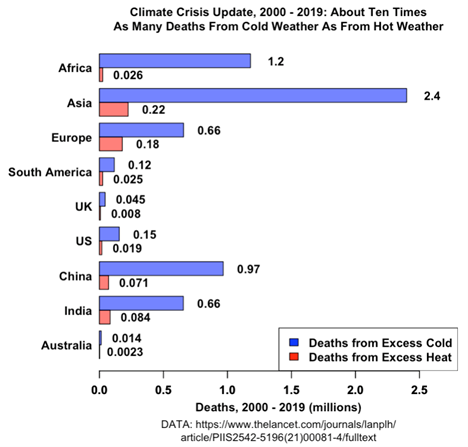The Wall Street Journal (WSJ) published an article reporting that in the lead up to the 27th Conference of the Parties to the U.N. Framework Convention on Climate Change (COP 27) in Egypt, climate scolds from the U.N. are inaccurately reporting that deaths related to temperatures are rising. This is false. As the WSJ accurately reports, data shows deaths related to extreme temperatures have fallen as Earth has modestly warmed.
In the WSJ article, titled “Climate Change and the Lancet’s ‘Heat Death’ Deception,” author Bjorn Lomborg, Ph.D., writes:
As the United Nations’ annual global climate summit, COP27, nears, it’s important to look with skepticism at the academic reports many news outlets cite as evidence supporting radical climate policies. Too often, they use highly skewed data that seem to have been carefully selected to support aggressive environmental regulations. One recent and much-cited Lancet report appears deliberately deceptive.
The study offers a frightening statistic: Rapidly rising temperatures have increased annual global heat deaths among older people by 68% in less than two decades.
Lomborg does not dispute the rise in heat related deaths among the elderly, but he does point out it only tells part of the story. The rise in the number of people over 65 succumbing heat related deaths is due to the fact that the number of people reaching the age of 65 or older over the past 20 years has increased by millions, not because temperatures have become appreciably hotter—they haven’t.
“It is hard not to see the Lancet study’s failure to adjust this figure as a deliberate act of deception,” writes Lomborg, discussing the Lancet’s oversight. “Any academic who works with statistics would know to adjust the deaths to account for population growth.”
Even worse, Lomborg notes the Lancet study cherry picked the data it reported on. Ignoring the large decline in deaths related to cold temperatures among the elderly and the general population alike.
“Based on today’s population size, the current temperatures cause about 17,000 more heat deaths in older people, but also result in more than half a million fewer cold deaths,” says Lomborg. “Reporting one finding without the other is misleading about the true effect of climate change.”
Of course this is not the first time Lomborg or Climate Realism have reported on the tremendous decline in deaths related to non-optimum temperatures over the past century.
Climate Realism has refuted claims that temperature related deaths are increasing in more than a dozen posts, for instance, here, here, here, and here.
Indeed, Climate Realism specifically addressed the misleading framing of the Lancet study’s results, here. That post points out that the Lancet Countdown study being referenced by the U.N. and the press in its alarming, fact-challenged reporting, is not the prominent medical journal, The Lancet, which publishes peer reviewed studies. Rather Lancet Countdown is a climate change activism project founded by the publishers of The Lancet composed of purported climate experts, all of like-minded alarmist bent.
Lancet Countdown’s misleading report is all the more shameful because it explicitly ignores sound peer-reviewed studies showing that deaths related to temperatures have declined dramatically as the Earth has warmed published by its parent medical journal, The Lancet.
A July 1, 2021 study published in The Lancet was arguably the largest study ever to examine excess mortality associated with temperature. The study’s authors, 68 scientists representing universities and research institutes in 33 countries spanning all regions of the world, came to two very clear conclusions: Cold temperatures contribute to far more deaths each year than warmer temperatures; and deaths associated with extreme temperatures, hot or cold, are declining.
Because cold related deaths outnumber deaths tied to extreme heat by 10 to 1, the study found hundreds of thousands fewer people have died in response to non-optimum temperatures each year as the earth has warmed in recent decades. (See the figure below)

The 2021 study confirmed what large scale 2015 study published in The Lancet previously found. In the 2015 study, researchers examined health data from 384 locations in 13 countries, accounting for more than 74 million deaths, and found cold weather, directly or indirectly, killed 1,700 percent more people than warm or hot weather.
Lomborg is among a growing number of scholars willing to speak the truth about climate change: it is happening but not disastrous, and, at least so far, humans are benefitting on net from it. Also, the Wall Street Journal is one of the few mainstream media outlets willing to publish that truth. Kuddos to both of them for placing an honest pursuit of the truth ahead of politics.

















